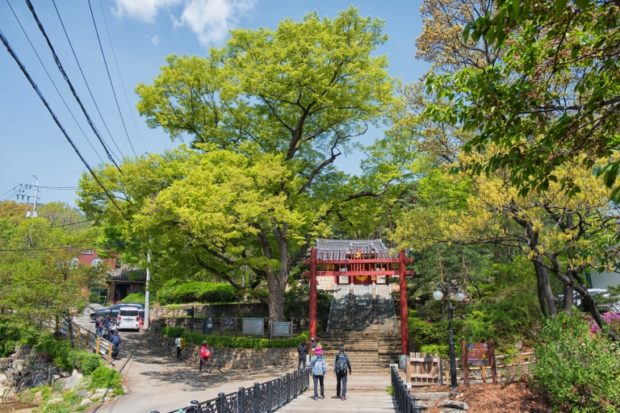Urban forests springing up around the world as cities battle heat, pollution

Seoul, Korea, April 27, 2019: Beautiful saturday morning, hikers walking on the Gwacheon entrance of Gwanaksan Mountain in Seoul. Image: july7th/IStock.com via AFP Relaxnews
Seoul, South Korea, has recently launched an urban forest project, hoping to lower city temperatures by up to 7 degrees Celsius. From Phoenix in the United States to Mumbai, India, and Paris, France, as cities try to combat pollution and improve air quality, urban forests are mushrooming.
In South Korea, Seoul residents are increasingly faced with intense summer heat. In the summer of 2018, the temperatures went up to 39.6 degrees Celsius during the hottest part of the day.
However, the capital’s geographical location has two things going for it: it’s overlooked by two mountainous massifs, Bukhansan to the north and Gwanaksan to the south. NowKorean authorities have decided to take advantage of the cooling properties of these relief features to try to ameliorate future heat waves.
The Seoul Metropolitan Government plans to install “wind path forests” along the rivers and roads, to create cooling air corridors that will flow into the city center. The project will commence as soon as November, and work will continue until the end of 2021. The total cost? About $15 million.
Wind-generating species such as pine and maple trees will be planted along the water. Wild cherry and oak, known for their ability to purify the air and absorb and block particulate matter, will also be planted on paths linking the forested areas to the city center.
Action plans in cities worldwide
The Seoul project is far from unique. In the United States, urban forests are being employed to help congested cities breathe. Boston has just closed a request for proposals to design its urban forest plan, while on the West Coast, Los Angeles has plans to plant 90,000 trees by 2021. In Phoenix, Arizona, the Tree and Shade Master Plan was passed in 2010 to transform the city and provide more shade and cleaner air. Phoenix has since speeded up its efforts, planting over 4,500 trees per year to create more shade.
Article continues after this advertisementIn Mumbai, India, authorities are trying to increase urban forest cover as fast as possible. An initiative to plant 10,000 local species of trees, with the support of DCB Bank, will use the Japanese Miyawaki technique, named for its inventor, of planting dense forests of native species, which allows the trees to grow up to a hundred times faster than usual.
Meanwhile in Paris, mayor Anne Hidalgo has announced plans for urban forests next to multiple city landmarks including the Hôtel de Ville, Paris’s city hall, the Opera Garnier and the Gare de Lyon. JB
RELATED STORIES:
Galapagos sees record rise in penguins, flightless cormorants
LOOK: Rare dinosaur skeleton found by 12-year-old boy while hiking